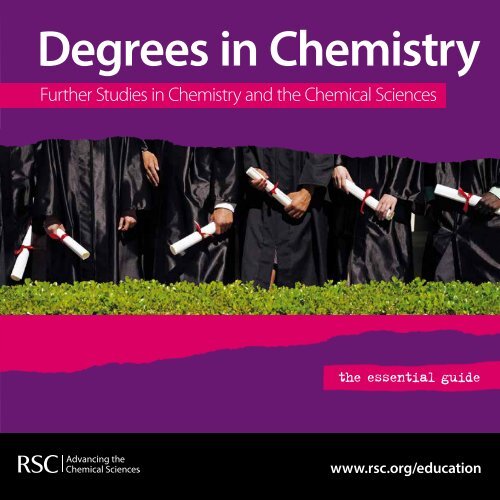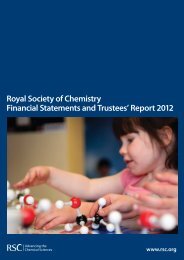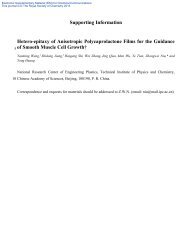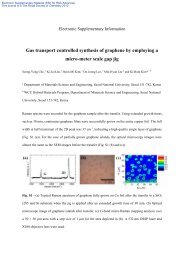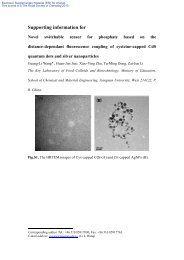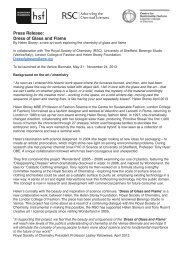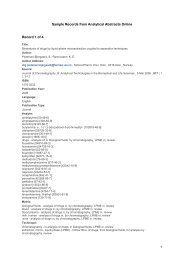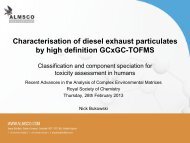Degrees in Chemistry - Royal Society of Chemistry
Degrees in Chemistry - Royal Society of Chemistry
Degrees in Chemistry - Royal Society of Chemistry
Create successful ePaper yourself
Turn your PDF publications into a flip-book with our unique Google optimized e-Paper software.
<strong>Degrees</strong> <strong>in</strong> <strong>Chemistry</strong><br />
Further Studies <strong>in</strong> <strong>Chemistry</strong> and the Chemical Sciences<br />
the essential guide<br />
www.rsc.org/education
Why study chemistry?<br />
A degree <strong>in</strong> chemistry opens the door to a wide range <strong>of</strong> career options – far more than you may have<br />
realised. Chemists are not just conf<strong>in</strong>ed to the lab!<br />
Chemists play a vital role <strong>in</strong> develop<strong>in</strong>g many <strong>of</strong> the everyday products we take for granted and help<br />
to susta<strong>in</strong> and improve our quality <strong>of</strong> life.<br />
Lots <strong>of</strong> tra<strong>in</strong>ed chemists end up <strong>in</strong> non-traditional chemistry careers because <strong>of</strong> all the transferable skills<br />
they ga<strong>in</strong> from study<strong>in</strong>g chemistry.<br />
© Arctic Images/Alamy<br />
www.rsc.org/education<br />
1
As a chemist you can…<br />
… fight disease<br />
… feed the world<br />
Discover new medic<strong>in</strong>es to prevent, treat<br />
and cure illness and f<strong>in</strong>d better ways <strong>of</strong><br />
diagnos<strong>in</strong>g disease.<br />
Develop new ways <strong>of</strong> controll<strong>in</strong>g plant and<br />
animal pests, or <strong>in</strong>vent novel foods and<br />
flavours.<br />
… <strong>in</strong>spire the<br />
next generation<br />
… protect our<br />
environment<br />
Share your chemistry knowledge as a<br />
teacher and help others to pursue an<br />
<strong>in</strong>terest <strong>in</strong> chemistry.<br />
Test the safety <strong>of</strong> products such as<br />
medic<strong>in</strong>es and cosmetics and f<strong>in</strong>d greener<br />
ways <strong>of</strong> mak<strong>in</strong>g them.<br />
… solve crime<br />
… <strong>in</strong>vent new products<br />
Use forensic techniques to analyse and<br />
<strong>in</strong>vestigate trace evidence from the scene<br />
<strong>of</strong> a crime.<br />
Create new materials for the 21st century,<br />
which can be used <strong>in</strong> anyth<strong>in</strong>g from solar<br />
panels to waterpro<strong>of</strong> jackets.<br />
2<br />
<strong>Degrees</strong> <strong>in</strong> chemistry the essential guide
Your skills<br />
The skills you develop while study<strong>in</strong>g for a chemistry qualification<br />
are highly desirable to employers <strong>in</strong> all sorts <strong>of</strong> sectors. Skills like:<br />
Logical th<strong>in</strong>k<strong>in</strong>g<br />
Communication<br />
Creativity<br />
Whether you know what you want to do after university or<br />
you’re still unsure, a chemistry qualification stands you <strong>in</strong> good<br />
stead for the future.<br />
Other careers<br />
Analysis<br />
Data handl<strong>in</strong>g<br />
Observation<br />
Study<strong>in</strong>g chemistry is also great tra<strong>in</strong><strong>in</strong>g for careers <strong>in</strong>:<br />
Sales and market<strong>in</strong>g<br />
Consultancy<br />
Central and local government<br />
Bus<strong>in</strong>ess and f<strong>in</strong>ance<br />
Law<br />
Publish<strong>in</strong>g<br />
Journalism<br />
Information technology<br />
And much more...<br />
It pays to do chemistry<br />
Independent research * shows that the average chemistry graduate<br />
earns substantially more over a lifetime than graduates <strong>of</strong> many<br />
other discipl<strong>in</strong>es:<br />
£190,000 more than those with two or more A-levels (no degree)<br />
£60,000 more than most other graduates – <strong>in</strong>clud<strong>in</strong>g those with<br />
degrees <strong>in</strong> subjects like history, english and psychology<br />
* The economic benefits <strong>of</strong> higher education qualifications. Price Waterhouse Coopers LLP January 2005<br />
www.rsc.org/education<br />
3
<strong>Degrees</strong> <strong>in</strong> chemistry the essential guide
Different types <strong>of</strong> chemistry degrees<br />
There is a wide variety <strong>of</strong> chemistry degree courses on <strong>of</strong>fer <strong>in</strong> the UK. These vary <strong>in</strong> content, duration<br />
and the qualification you achieve, as well as the types <strong>of</strong> career they prepare you for.<br />
BSc or MChem/MSci?<br />
Most universities now <strong>of</strong>fer both BSc (Bachelor <strong>of</strong> Science) and<br />
MChem/MSci (Master <strong>of</strong> <strong>Chemistry</strong>/Science) degree programmes.<br />
MChem and MSci degrees have exactly the same status as each<br />
other, these courses simply have different names at different<br />
universities.<br />
BSc degrees<br />
Usually <strong>in</strong>volve study<strong>in</strong>g for three years (four <strong>in</strong> Scotland)<br />
Provide excellent tra<strong>in</strong><strong>in</strong>g <strong>in</strong> the chemical sciences and can open<br />
doors to a huge range <strong>of</strong> careers<br />
May <strong>in</strong>volve a year <strong>in</strong> <strong>in</strong>dustry or abroad<br />
MChem/MSci degrees<br />
Usually <strong>in</strong>volve study<strong>in</strong>g for four years (five <strong>in</strong> Scotland)<br />
Provide a more <strong>in</strong>-depth study <strong>of</strong> chemistry than BSc degrees<br />
and usually <strong>in</strong>volve a significant research project<br />
Offer more opportunities to develop skills such as presentation<br />
skills, problem solv<strong>in</strong>g and communication skills<br />
May <strong>in</strong>volve a year <strong>in</strong> <strong>in</strong>dustry or abroad<br />
Provide a good basis for a PhD or a career <strong>in</strong> chemical science<br />
research<br />
Still not sure?<br />
If you’re not sure whether you want to do a BSc or an MChem/MSci<br />
many universities recommend that you apply for the longer course<br />
<strong>in</strong> the first <strong>in</strong>stance. Transferr<strong>in</strong>g from an MChem/MSci to a BSc is<br />
usually relatively straightforward but it may be harder to transfer<br />
the other way.<br />
MChem/MSci courses may help keep your options open if you’re<br />
undecided about what to do after university (especially if you might<br />
want to do a PhD or go <strong>in</strong>to research).<br />
Check out<br />
http://rsc.li/employee-pr<strong>of</strong>iles<br />
for case studies <strong>of</strong> chemistry graduates work<strong>in</strong>g <strong>in</strong> a range <strong>of</strong><br />
careers, with <strong>in</strong>formation <strong>in</strong>clud<strong>in</strong>g how they got there and what<br />
their job <strong>in</strong>volves on a day-to-day basis<br />
www.futuremorph.org<br />
for <strong>in</strong>formation on careers <strong>in</strong> science<br />
www.ucas.com<br />
use the UCAS website to research your course and university<br />
choices<br />
www.rsc.org/education<br />
5
<strong>Chemistry</strong> with<br />
<strong>in</strong>dustrial experience<br />
Many universities <strong>of</strong>fer degree courses that <strong>in</strong>volve a period <strong>of</strong> work<br />
<strong>in</strong> <strong>in</strong>dustry. The experience you ga<strong>in</strong> is valuable if you are hop<strong>in</strong>g<br />
to enter a career <strong>in</strong> <strong>in</strong>dustry (it may even lead directly to a job after<br />
you f<strong>in</strong>ish your degree). If you are undecided about what you want<br />
to do after university it may help you make up your m<strong>in</strong>d about<br />
whether this type <strong>of</strong> career is for you.<br />
Students are usually paid by <strong>in</strong>dustry dur<strong>in</strong>g their placement year.<br />
Industrial placements and <strong>in</strong>ternships are advertised on<br />
http://rsc.li/cw-jobs<br />
<strong>Chemistry</strong> with a<br />
year abroad<br />
There are lots <strong>of</strong> degree programmes <strong>in</strong> chemistry and related<br />
subjects that <strong>in</strong>volve a year at a university abroad. You could spend<br />
the year <strong>in</strong> Europe, the US or even Asia or Australia.<br />
The first two years <strong>of</strong> these courses are normally spent follow<strong>in</strong>g the<br />
appropriate chemical science programme <strong>in</strong> a UK university and<br />
acquir<strong>in</strong>g any language skills you might need while abroad. You will<br />
then spend the third year study<strong>in</strong>g abroad. Dur<strong>in</strong>g this year you will<br />
follow the syllabus <strong>of</strong> the host university and will be assessed before<br />
return<strong>in</strong>g to the UK for your f<strong>in</strong>al year.<br />
<strong>Chemistry</strong> ‘with’ courses<br />
These courses generally <strong>in</strong>volve spend<strong>in</strong>g at least 60% <strong>of</strong> your<br />
time study<strong>in</strong>g chemistry and the rema<strong>in</strong>der study<strong>in</strong>g another<br />
subject, e.g.<br />
<strong>Chemistry</strong> with Management<br />
<strong>Chemistry</strong> with Law<br />
<strong>Chemistry</strong> with Environmental Science<br />
<strong>Chemistry</strong> ‘and’ courses<br />
These courses generally <strong>in</strong>volve spend<strong>in</strong>g 50% <strong>of</strong> your time study<strong>in</strong>g<br />
chemistry, and 50% study<strong>in</strong>g another subject, e.g.<br />
<strong>Chemistry</strong> and French<br />
<strong>Chemistry</strong> and Bus<strong>in</strong>ess<br />
<strong>Chemistry</strong> and Mathematics<br />
If you’re <strong>in</strong>terested <strong>in</strong> study<strong>in</strong>g a ‘chemistry with…’ or ‘chemistry<br />
and…’ course, it’s important to consider how this might affect<br />
your future career options. Many jobs with<strong>in</strong> the chemical and<br />
pharmaceutical <strong>in</strong>dustries will only be available to graduates who<br />
have spent a considerable amount <strong>of</strong> time <strong>in</strong> teach<strong>in</strong>g laboratories<br />
develop<strong>in</strong>g their practical skills.<br />
www.rsc.org/education<br />
7
Other degrees<br />
<strong>in</strong>volv<strong>in</strong>g chemistry<br />
Many degree courses <strong>in</strong>clude a significant amount <strong>of</strong> chemistry.<br />
These are collectively referred to as chemical science courses.<br />
They <strong>in</strong>clude subjects like biochemistry, chemical eng<strong>in</strong>eer<strong>in</strong>g<br />
and pharmaceutical science. These degrees all require a good<br />
knowledge and understand<strong>in</strong>g <strong>of</strong> the chemical pr<strong>in</strong>ciples that<br />
underp<strong>in</strong> them.<br />
Specialised<br />
chemistry courses<br />
Some courses allow you to specialise <strong>in</strong> a particular field <strong>of</strong><br />
chemistry, e.g.<br />
Medic<strong>in</strong>al <strong>Chemistry</strong><br />
Analytical <strong>Chemistry</strong><br />
Nanotechnology<br />
Environmental <strong>Chemistry</strong><br />
If you are th<strong>in</strong>k<strong>in</strong>g about study<strong>in</strong>g for a specialised chemistry<br />
degree, you need to be certa<strong>in</strong> that you are <strong>in</strong>terested <strong>in</strong> the area<br />
you choose. By choos<strong>in</strong>g a more specialised chemistry degree you<br />
may be narrow<strong>in</strong>g the options <strong>of</strong> what you can do after university.<br />
Research <strong>in</strong>to the subject is vital, especially if you haven’t studied it at<br />
school or college.<br />
If you’re not 100 per cent sure about what is <strong>in</strong>volved and whether<br />
you’ll like it, you may want to choose a more general chemistry<br />
degree that allows you to specialise <strong>in</strong> the f<strong>in</strong>al years <strong>of</strong> the course,<br />
when you have a better understand<strong>in</strong>g <strong>of</strong> what is <strong>in</strong>volved and<br />
which aspects you most enjoy.<br />
8 <strong>Degrees</strong> <strong>in</strong> <strong>Chemistry</strong> the essential guide
Other th<strong>in</strong>gs<br />
to consider<br />
Do your maths skills add up?<br />
Mathematics is important <strong>in</strong> many aspects <strong>of</strong> chemistry and is a key<br />
part <strong>of</strong> most chemistry degree courses.<br />
Not study<strong>in</strong>g maths A-level/Higher will limit your university choices.<br />
Although a maths A-level/Higher is not required for entry onto all<br />
chemistry degree courses, you should seriously consider study<strong>in</strong>g<br />
the subject, at least to AS Level (or Higher <strong>in</strong> Scotland). If you are<br />
unable to do this, it may be worth consider<strong>in</strong>g some form <strong>of</strong><br />
tutor<strong>in</strong>g to help refresh and extend your maths knowledge.<br />
If you haven’t studied maths post-16, don’t panic! Most universities<br />
provide extra maths support dur<strong>in</strong>g your degree (especially <strong>in</strong> the<br />
first year).<br />
Are you <strong>in</strong>terested <strong>in</strong> a chemistry degree but worried you<br />
don’t have the necessary qualifications?<br />
Some universities <strong>of</strong>fer a foundation year (or access course) as<br />
part <strong>of</strong> their chemistry course. These one-year programmes are<br />
designed for students who have shown the ability, but do not<br />
possess the necessary qualifications (with respect to either grades<br />
or subjects) for direct entry onto BSc or MChem/MSci courses. After<br />
complet<strong>in</strong>g the foundation year you should be eligible to progress,<br />
as appropriate, onto the university’s BSc or MChem/MSci course.<br />
The foundation year may cover a range <strong>of</strong> topics, <strong>in</strong>clud<strong>in</strong>g<br />
laboratory work, a project, mathematics and elements <strong>of</strong> other<br />
science subjects. For <strong>in</strong>formation on different routes <strong>in</strong>to university<br />
talk to university admissions tutors or visit the Access to HE website:<br />
www.accesstohe.ac.uk<br />
Costs <strong>of</strong> study<strong>in</strong>g<br />
From September 2012, universities can charge up to £9,000 a year<br />
for their courses, so it is more important than ever to th<strong>in</strong>k about the<br />
costs <strong>of</strong> study<strong>in</strong>g.<br />
Th<strong>in</strong>gs to remember are that there are no upfront costs. You can get<br />
a loan to cover the cost <strong>of</strong> your tuition, which you only start to pay<br />
back when you are earn<strong>in</strong>g over £21,000 a year.<br />
There is also a loan available to help with your liv<strong>in</strong>g costs such as<br />
food, accommodation and travel.<br />
For more <strong>in</strong>formation on student f<strong>in</strong>ance visit<br />
www.gov.uk/student-f<strong>in</strong>ance<br />
More <strong>in</strong>formation<br />
on courses<br />
University admissions tutors should be able to give you more<br />
<strong>in</strong>formation on <strong>in</strong>dividual courses and on the employment<br />
dest<strong>in</strong>ations <strong>of</strong> previous graduates, so this is someth<strong>in</strong>g you<br />
should ask about at university open days. You can access <strong>in</strong>dividual<br />
university websites through the UCAS website:<br />
www.ucas.com<br />
RSC recognised and accredited degree courses<br />
The RSC recognises and accredits a wide range <strong>of</strong> chemical science<br />
degrees with academic content that meets specified standards. This<br />
helps you to choose a quality degree programme, which will give<br />
you an advantage when look<strong>in</strong>g for a job <strong>in</strong> the future. A list <strong>of</strong> the<br />
chemical science courses accredited by the RSC is available at<br />
http://rsc.li/accreditation<br />
www.rsc.org/education<br />
9
<strong>Degrees</strong> <strong>in</strong> chemistry the essential guide
Degree alternatives<br />
Do you want to cont<strong>in</strong>ue study<strong>in</strong>g chemistry when you<br />
leave school but don’t th<strong>in</strong>k a degree is for you?<br />
There are other options available for study<strong>in</strong>g chemistry <strong>in</strong> higher<br />
education besides a traditional degree. These <strong>in</strong>clude Higher<br />
National Certificates (HNCs), Higher National Diplomas (HNDs) and<br />
foundation degrees.<br />
Higher National Certificates (HNCs) and Higher National<br />
Diplomas (HNDs)<br />
HNCs and HNDs are vocational (work-related) qualifications that<br />
tra<strong>in</strong> you <strong>in</strong> a particular job sector. Many are designed with <strong>in</strong>dustry<br />
to ensure you ga<strong>in</strong> the skills and knowledge employers are<br />
look<strong>in</strong>g for.<br />
Foundation degrees<br />
Foundation degrees are employment-based higher education<br />
qualifications which provide pr<strong>of</strong>essional development <strong>in</strong> a broad<br />
range <strong>of</strong> vocational areas.<br />
Foundation degrees take two years to complete full-time but some<br />
are available to study part-time or by flexible learn<strong>in</strong>g, <strong>of</strong>ten while<br />
at work, which usually takes three to four years. They are broadly<br />
equivalent to the first two years <strong>of</strong> a Bachelor’s degree and can<br />
<strong>of</strong>ten be topped up to a degree with further study.<br />
Apprenticeships<br />
There are different levels <strong>of</strong> apprenticeships but all <strong>in</strong>volve workbased<br />
learn<strong>in</strong>g and complet<strong>in</strong>g at least one nationally recognised<br />
qualification. As an apprentice, you will earn a wage and ga<strong>in</strong><br />
valuable pr<strong>of</strong>essional experience <strong>in</strong> <strong>in</strong>dustry.<br />
On average, an apprenticeship takes between one and four years<br />
to complete - depend<strong>in</strong>g on the level and the amount <strong>of</strong> time you<br />
have to study. You can f<strong>in</strong>d out more from the Apprenticeships<br />
website: www.apprenticeships.org.uk<br />
Where do these<br />
qualifications lead?<br />
S<strong>in</strong>ce HNCs, HNDs and foundation degrees are designed to equip<br />
you with the skills and knowledge for a particular field <strong>of</strong> work, they<br />
can lead straight <strong>in</strong>to a career. They can also be used to develop<br />
skills and knowledge once you are <strong>in</strong> a job.<br />
If you decide that you want to carry on study<strong>in</strong>g then these<br />
qualifications can also be used to progress onto a higher level<br />
course, such as a degree.<br />
Those with vocational qualifications and <strong>in</strong>dustrial experience<br />
(<strong>in</strong>clud<strong>in</strong>g apprentices) can now ga<strong>in</strong> pr<strong>of</strong>essional recognition<br />
by becom<strong>in</strong>g a Registered Science Technician (RSciTech) or a<br />
Registered Scientist (RSci).<br />
Study part-time<br />
Most degree courses are full-time but you can also study part-time<br />
while you are work<strong>in</strong>g, for example with the Open University.<br />
www.open.ac.uk<br />
The OpenPlus scheme from the Open University and its partner<br />
universities <strong>of</strong>fers a great way to get started with a chemistry degree<br />
if you f<strong>in</strong>d your grades or f<strong>in</strong>ancial situation prevent you from<br />
study<strong>in</strong>g full time for a chemistry degree course. You can apply for<br />
the course irrespective <strong>of</strong> your qualifications and if you are successful<br />
over the first two years <strong>of</strong> study with the Open University you can<br />
transfer onto a full time degree course with a partner university.<br />
www.open.ac.uk/choose/openplus<br />
www.rsc.org/education<br />
11
Questions you should ask<br />
There are a number <strong>of</strong> th<strong>in</strong>gs you should th<strong>in</strong>k about before mak<strong>in</strong>g a decision about exactly what and<br />
where you want to study. Some <strong>of</strong> these are listed below. There is no right or wrong answer to these<br />
questions – it’s just a case <strong>of</strong> what’s best for you.<br />
Once you have a better idea about what you’re look<strong>in</strong>g for, ask the follow<strong>in</strong>g questions about your<br />
preferred <strong>in</strong>stitution and course. The answers will help you make the right decision for you.<br />
Degree course options<br />
What qualification do I get?<br />
What career options will I have when I’ve completed my degree?<br />
Should I choose chemistry or another chemical science degree?<br />
Entry requirements<br />
What are the entry requirements for the course? Am I likely to<br />
meet them?<br />
Might a foundation year course be suitable for me if I don’t<br />
expect to meet the requirements for the course I’d like to do?<br />
Can I switch course mid-degree?<br />
Life at university<br />
Where will I feel most comfortable? (Near home? On a campus?<br />
In a city?)<br />
What is the background <strong>of</strong> other students on the course?<br />
Do I like the location <strong>of</strong> the university?<br />
What accommodation is available and for how long? Is the<br />
accomodation catered or self-cater<strong>in</strong>g?<br />
Costs<br />
What expenses will I have? Books, lab coat, safety glasses,<br />
other costs?<br />
How much will it cost me <strong>in</strong> accommodation and tuition fees?<br />
When will I have to pay?<br />
Will I get f<strong>in</strong>ancial support? Are any bursaries or scholarships<br />
available?<br />
Practical work <strong>in</strong><br />
the laboratory<br />
Will I work as an <strong>in</strong>dividual, <strong>in</strong> pairs or as part <strong>of</strong> a bigger group?<br />
What k<strong>in</strong>d <strong>of</strong> experiments will I do <strong>in</strong> the first year?<br />
Will I work at my own pace or to a fixed schedule?<br />
How do the experiments fit <strong>in</strong>to the lecture course?<br />
Assessment<br />
How and when will I be assessed?<br />
Is there a practical exam?<br />
What happens if I fail an exam?<br />
12 <strong>Degrees</strong> <strong>in</strong> <strong>Chemistry</strong> the essential guide
General teach<strong>in</strong>g<br />
arrangements<br />
What is the student : lecturer/tutor ratio?<br />
Is the style <strong>of</strong> teach<strong>in</strong>g different to that <strong>in</strong> schools and colleges?<br />
If so, how?<br />
Will the course take <strong>in</strong>to account my study background and<br />
experience?<br />
Can I get help if I f<strong>in</strong>d the work difficult?<br />
Course structure<br />
What is the chemistry curriculum <strong>in</strong> the first year?<br />
How many students will there be <strong>in</strong> a lecture, tutorial etc.?<br />
What will be my total contact time with lecturers/tutors<br />
per week?<br />
How much practical work will I do?<br />
What is a typical student week?<br />
Non-contact time<br />
How many hours work will I be directed to do each week?<br />
How much other work will I be expected to do?<br />
What are the library and computer facilities like and can I access<br />
them remotely?<br />
www.rsc.org/education<br />
13
Career choices<br />
You may not have decided on your future career yet - don’t worry. A degree <strong>in</strong> chemistry or a related<br />
subject can really allow you to keep your options open. You may start to get an idea <strong>of</strong> what you<br />
want from your career as you make progress through your degree. If you have some career ideas then<br />
consider the follow<strong>in</strong>g:<br />
Consider this<br />
Is my choice relevant or acceptable as tra<strong>in</strong><strong>in</strong>g for my future<br />
career?<br />
What do students typically do after this degree course?<br />
What percentage <strong>of</strong> graduates get a job on leav<strong>in</strong>g university?<br />
Is the course designed to produce researchers, <strong>in</strong>dustrial chemists<br />
or someth<strong>in</strong>g else?<br />
Do your research<br />
Once you’ve got an idea about what you’d like to do, talk to your<br />
parents, teachers and university admission tutors about any<br />
questions you have. Also…<br />
Check out the UCAS (www.ucas.com) and <strong>in</strong>dividual university<br />
websites.<br />
Go to university open days – these are a great way to get answers<br />
to lots <strong>of</strong> questions and to f<strong>in</strong>d out about the place where you’ll<br />
be liv<strong>in</strong>g and study<strong>in</strong>g for the next few years.<br />
See www.opendays.com for open day dates and more advice on<br />
how to get the most out <strong>of</strong> them.<br />
You can also f<strong>in</strong>d useful <strong>in</strong>formation at www.rsc.org/education<br />
The more <strong>in</strong>formation you can get the easier it will be to make the<br />
right decision for you.<br />
Work experience<br />
Gett<strong>in</strong>g some work experience can be a great way to ga<strong>in</strong> new<br />
skills, collect ideas for your next move and help make your CV stand<br />
out from the crowd.<br />
If you get some relevant work experience while you’re still at school<br />
or college, you’ll have someth<strong>in</strong>g extra to add to your personal<br />
statement when apply<strong>in</strong>g to university.<br />
Alternatively, you may want to apply for summer placements<br />
dur<strong>in</strong>g your holidays before you go to university or while you are at<br />
university. This may be especially important if you know you want<br />
to work <strong>in</strong> research or <strong>in</strong>dustry when you graduate – it shows you’re<br />
keen and already have knowledge and experience <strong>of</strong> work<strong>in</strong>g <strong>in</strong><br />
this environment.<br />
The Prospects website has useful advice on how to f<strong>in</strong>d a work<br />
experience placement: www.prospects.ac.uk<br />
You may also want to look at the Year <strong>in</strong> Industry website<br />
www.y<strong>in</strong>i.org.uk It <strong>of</strong>fers young people paid, degree-relevant work<br />
placements <strong>in</strong> a year out before or dur<strong>in</strong>g a university course.<br />
www.rsc.org/education<br />
15
To get your hands on more chemistry <strong>in</strong>formation, jo<strong>in</strong> RSC ChemNet, the membership network for<br />
young people run by the RSC. It is free to jo<strong>in</strong> for all 14 - 18 year old chemistry students.<br />
Jo<strong>in</strong> RSC ChemNet Contact<br />
By jo<strong>in</strong><strong>in</strong>g RSC ChemNet you will have free onl<strong>in</strong>e access to<br />
our student magaz<strong>in</strong>e, The Mole, expert advice and engag<strong>in</strong>g<br />
<strong>in</strong>teractive resources to support your study <strong>of</strong> chemistry. You will be<br />
able to seek guidance with university choices, and attend events to<br />
discover what a career <strong>in</strong> chemistry and university has to <strong>of</strong>fer.<br />
To f<strong>in</strong>d out more, visit http://rsc.li/chemnet<br />
Meet the Universities<br />
Meet the Universities takes place every summer and br<strong>in</strong>gs<br />
chemistry students together with representatives from <strong>in</strong>stitutions<br />
<strong>of</strong>fer<strong>in</strong>g courses <strong>in</strong> chemical science.<br />
If you are consider<strong>in</strong>g a degree <strong>in</strong> chemistry or the chemical<br />
sciences then this is a great opportunity for you to talk directly to<br />
staff and students from many <strong>of</strong> the UK’s universities.<br />
To f<strong>in</strong>d out more, visit http://rsc.li/mtu<br />
For further <strong>in</strong>formation contact:<br />
<strong>Royal</strong> <strong>Society</strong> <strong>of</strong> <strong>Chemistry</strong><br />
Education Department<br />
Thomas Graham House, Science Park, Milton Road<br />
Cambridge, CB4 0WF<br />
Tel: +44 (0)1223 432221<br />
Fax: +44 (0)1223 423623<br />
E-mail: education@rsc.org<br />
www.rsc.org/education<br />
16 <strong>Degrees</strong> <strong>in</strong> <strong>Chemistry</strong> the essential guide
<strong>Royal</strong> <strong>Society</strong> <strong>of</strong> <strong>Chemistry</strong><br />
Email: www.rsc.org/education<br />
Registered Charity Number: 207890<br />
© <strong>Royal</strong> <strong>Society</strong> <strong>of</strong> <strong>Chemistry</strong> 2013<br />
Thomas Graham House<br />
Science Park, Milton Road<br />
Cambridge, CB4 0WF, UK<br />
Tel: +44 (0)1223 420066<br />
Burl<strong>in</strong>gton House<br />
Piccadilly, London<br />
W1J 0BA, UK<br />
Tel: +44 (0)20 7437 8656<br />
RSC International Offices<br />
São Paulo, Brazil<br />
Beij<strong>in</strong>g, Ch<strong>in</strong>a<br />
Shanghai, Ch<strong>in</strong>a<br />
Bangalore, India<br />
Tokyo, Japan<br />
Philadelphia, USA


